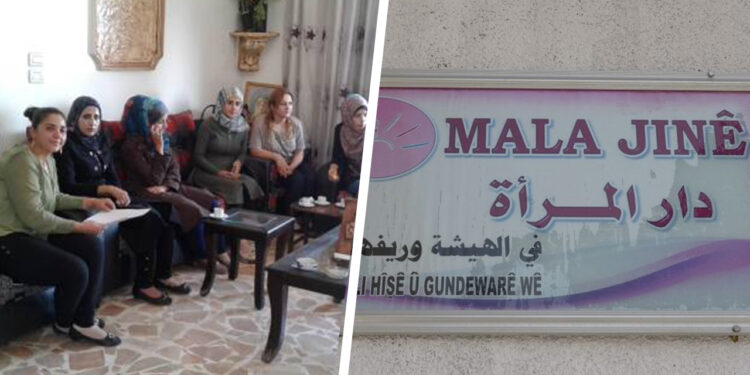The Rojava revolution in North and East Syria has become a world-famous example of women’s liberation. Women’s houses – called “Mala Jin” – have played a key role in mediation and reconciliation within civil society, as well as providing education and protection for women. This article offers a detailed insight into the works of the Mala Jin.
The women’s revolution in North and East Syria (NES) has become well-known around the world. For most people familiar with the revolution, it brings to mind the Kurdish-led, all-female fighting force known as the Women’s Protections Units (YPJ) and the key role they played in the defeat of Islamic State (ISIS). But the women’s revolution cannot be reduced only to its military aspects. On the contrary, it has made an impact in every part of political, economic and social life.
The women’s movement has established numerous organisations and institutions within and linked to the governing Autonomous Administration of North and East Syria (AANES) to address the challenges women face in society. These initiatives provide structural solutions, including safe houses for women in danger, educational opportunities for both women and men, and programmes to foster women’s economic independence.
Mala Jin: Women’s Houses
One such institution is the “Mala Jin” (Women’s Houses), spaces organised by women to offer help and support to those facing family issues or civil disputes. These houses provide a refuge and a framework for resolving conflicts.
The first Mala Jin officially opened on 20 March 2011, predating the Rojava Revolution, which began on 19 July 2012. It was established by Kongra Star (formerly Yekitiya Star), an organisation founded in 2005 as a clandestine network of mostly Kurdish women operating under the Ba’ath regime. In its early years, many members faced persecution, including arrests and torture by security forces.
Evolution Over Time
Since the opening of the first Mala Jin, 13 years have passed, during which the region has endured civil war and revolution. These events have transformed society but left behind a traumatized population and grieving families, alongside a monumental task of reconstruction. The pre-existing violence against women and children has been exacerbated by the conflict.
Today, there are 47 Mala Jin across North and East Syria, providing counsel to women and families. They address social issues such as domestic violence, child marriage, divorce, and inheritance. Their primary activities include mediation, reconciliation, and education. Additionally, they offer safe shelters for women in crisis.
Mediation and Reconciliation
Most cases brought to the Mala Jin are resolved internally through mediation by their members. When needed, the Mala Jin collaborates with other women’s structures within the administration, ranging from Social Reconciliation Committees at the commune level (the smallest local decision-making body) to the Women’s Justice Committee, which operates at the sub-district and regional levels, and the Social Justice Committee of Kongra Star.
Conflicts between husbands and wives are the most frequently reported cases. Separate meetings are first held with each party—starting with the wife—to ensure a safe environment for open discussion. Once both are prepared, joint sessions are organized to facilitate dialogue and help them reach a mutual understanding. The Mala Jin monitors these cases through home visits and remains available for follow-up.

If mediation fails, the case is escalated to the courts. Representatives of the Mala Jin assist by offering advice and opinions to judges while providing support to the women involved. The court operates on a three-person panel comprising both men and women.
Addressing Domestic Violence
In cases of domestic violence or threats, women can seek protection at the Mala Jin. Outside of operating hours, they can turn to the Women’s Internal Security Forces (Asayîşa Jin), who coordinate with the Mala Jin. Visible injuries are documented in hospital reports, which are directly forwarded to the appropriate court. The Women’s Internal Security Forces arrest perpetrators, and investigations are conducted by the Women’s Justice Council.
For women unable to leave their homes, relatives or neighbors can report the abuse to the Mala Jin or the local commune. Members of the Mala Jin and the Women’s Internal Security Forces respond promptly, removing the women from harm, documenting evidence, and filing criminal cases against the perpetrators.
The Mala Jin also conducts routine house visits to observe women for signs of abuse or distress. If domestic violence is suspected, immediate action is taken to ensure the woman’s safety.
Women in need of protection can stay at temporary Women’s Protection Houses until a long-term solution is found. For those who cannot return home safely, alternative housing and employment opportunities are arranged.
Education Initiatives
Education is another vital aspect of the Mala Jin’s work. They provide training to both men and women on topics such as women’s rights, health, marital issues, and underage marriage. These programs aim to raise awareness, strengthen community ties, and challenge entrenched social norms.

Transforming Society
The collective efforts of the Mala Jin have paved the way for real societal change. As women become more aware of their rights and the support systems available to them, communities are experiencing a shift in mindset. Men are increasingly held accountable for their actions, and educational opportunities encourage them to adopt progressive attitudes.

The Mala Jin continues to adapt its services to meet the evolving needs of society. Following the Turkish military’s occupation of Afrin (Efrîn), Tel Abyad (Girê Spî), and Ras al-Ayn (Serê Kaniyê) in 2018 and 2019, the region has faced large-scale displacement and ongoing attacks. Turkish military operations have also destroyed civilian infrastructure, leaving millions without reliable electricity or running water.
These challenges place immense pressure on the women of North and East Syria, but the Mala Jin perseveres. Through their tireless work, they are building a new society rooted in women’s liberation and resilience.

